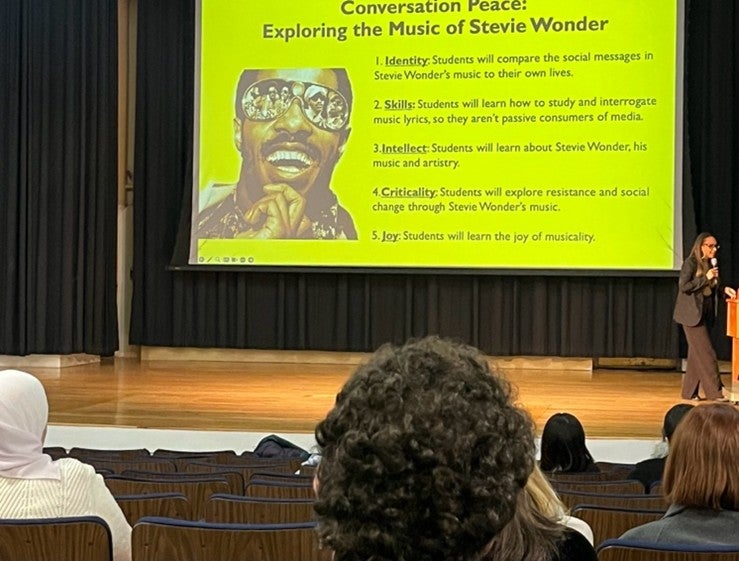Gholnecsar (Gholdy) Muhammad delivers moving address advocating for the critical role of joy in academic into curriculum.
It is time for a new day: Implementing Genius, Justice and Joy in curriculum “It is not just about skills and standards. It’s about students in their lives, their identities and knowing who they are and finding refuge and a sense of self.”
This is what happens when genius, justice and joy are implemented in curriculum and classrooms, as Gholnecsar (Gholdy) Muhammad, professor of literacy, language, and culture at the University of Illinois/Chicago, and a leading voice in culturally and historically responsive education, told an audience of about 100 students and educators, in her address of the Feinstein College of Education’s annual Finkelstein lecture on February 19 in Edwards Auditorium.
Muhammad studies Black historical excellence within educational communities to reframe curriculum and instruction to meet the needs of today’s classroom, and has been named in the top 1 percent of educational influencers for 2022-2025.
She believes that we’re not reaching many of our students, especially Black students, because curricula and standards emphasize skills and standardized tests.
Her educational model, an equity framework for teaching and learning across disciplines, outlines five pursuits of education – identity, skill, intellect, criticality and joy – to help educators develop students’ histories, identities, literacies, and liberation that informs learning goals, lesson plans, and the teaching texts.
Muhammad highlighted the critical role of joy in academic success and belonging, advocating for its integration into the curriculum, explaining that joyful, safe, and inclusive environments honor students’ identities and promote critical thinking and self-expression.
These practices, she said, “haven’t been normalized, especially in K-12. We don’t access joy. Historically, it has never been addressed.”
Muhammad demonstrated several examples of putting these pursuits into practice, including a lesson about peace through the music of Stevie Wonder.
Identity: Students will compare the social messages in Steve Wonder’s music to their own lives.
Skills: Students will learn how to study and interrogate music lyrics, so they aren’t passage consumers of media.
Intellect: Students will learn about Stevie Wonder, his music and artistry.
Criticality: Students will explore resistance and social change through Stevie Wonder’s music.
Joy: Students will learn the joy of music.
Genius, she said, isn’t just academic, it is around us on many levels, citing examples of young students braiding hair in perfect ratio, freestyling (improvised verse), and taking apart then re-assembling things in perfect placement.
“Believe in their genius,” she said.
She added that genius has been evident throughout history. Her love of history is the foundation of her work because, “Everything can be answered through history.
She likened 13th Century poet Rumi’s description of a flower blooming to opening of students’ minds. The literary societies of the 1800s, where people gathered to think, write, debate, and engage in lectures, were endeavors towards creating a better humanity, as were the 1954 Brown v Board of Education landmark Supreme Court case that overturned the school segregation, and the 1969 student movements protesting standardized tests, and demanding more relevant books and qualified teachers.
The ever-evolving topic of justice in the classroom is more than access and representation, according to Muhammad. She said that educators need to be ideologically prepared and anti-oppressive to ensure that curriculum and environments reflect justice.
“Children have been teaching us justice for a long time,” she said, adding that children understand that differences their skin color, language, culture cause separation, and she encourages teachers to engage the students’ full selves into lessons.
“There are more animals in children’s books than there are people of color,” she said.
Muhammad authored the best-sellers, “Cultivating Genius” and “Unearthing Joy” that include musical playlists, poetry, art and creative activities to stimulate the learning process and invoke joy. Her HILL educational model has been adopted in school districts across the United States, and has been applied to life models as well as medical, music, and mixed-media practices.
Muhammad ended her talk with the challenge to go forward and “unearth, uproot, mine and bring genius to the surface.”


